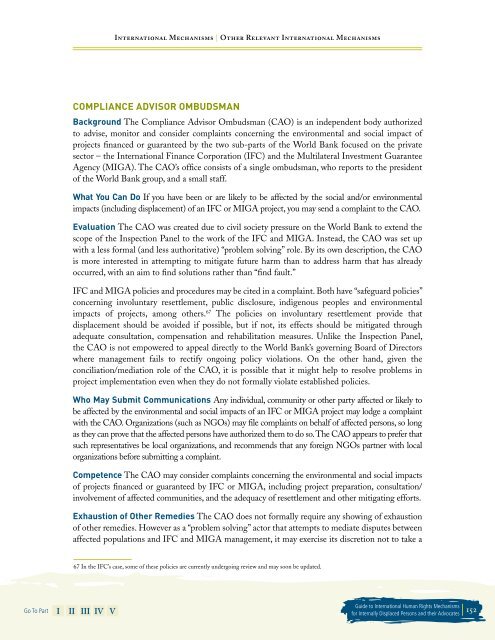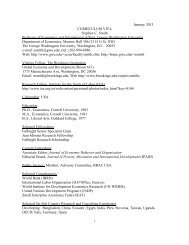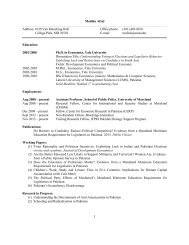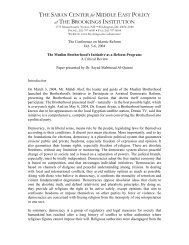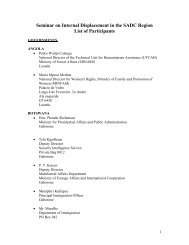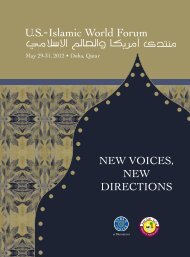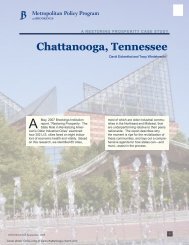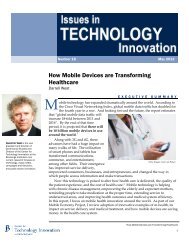Guide to International Human Rights Mechanisms - Brookings
Guide to International Human Rights Mechanisms - Brookings
Guide to International Human Rights Mechanisms - Brookings
You also want an ePaper? Increase the reach of your titles
YUMPU automatically turns print PDFs into web optimized ePapers that Google loves.
Go To Part I II III IV V<br />
<strong>International</strong> <strong>Mechanisms</strong> | Other Relevant <strong>International</strong> <strong>Mechanisms</strong><br />
comPliance aDvisor omBuDsman<br />
Background The Compliance Advisor Ombudsman (CAO) is an independent body authorized<br />
<strong>to</strong> advise, moni<strong>to</strong>r and consider complaints concerning the environmental and social impact of<br />
projects financed or guaranteed by the two sub-parts of the World Bank focused on the private<br />
sec<strong>to</strong>r – the <strong>International</strong> Finance Corporation (IFC) and the Multilateral Investment Guarantee<br />
Agency (MIGA). The CAO’s office consists of a single ombudsman, who reports <strong>to</strong> the president<br />
of the World Bank group, and a small staff.<br />
What you can Do If you have been or are likely <strong>to</strong> be affected by the social and/or environmental<br />
impacts (including displacement) of an IFC or MIGA project, you may send a complaint <strong>to</strong> the CAO.<br />
evaluation The CAO was created due <strong>to</strong> civil society pressure on the World Bank <strong>to</strong> extend the<br />
scope of the Inspection Panel <strong>to</strong> the work of the IFC and MIGA. Instead, the CAO was set up<br />
with a less formal (and less authoritative) “problem solving” role. By its own description, the CAO<br />
is more interested in attempting <strong>to</strong> mitigate future harm than <strong>to</strong> address harm that has already<br />
occurred, with an aim <strong>to</strong> find solutions rather than “find fault.”<br />
IFC and MIGA policies and procedures may be cited in a complaint. Both have “safeguard policies”<br />
concerning involuntary resettlement, public disclosure, indigenous peoples and environmental<br />
impacts of projects, among others. 67 The policies on involuntary resettlement provide that<br />
displacement should be avoided if possible, but if not, its effects should be mitigated through<br />
adequate consultation, compensation and rehabilitation measures. Unlike the Inspection Panel,<br />
the CAO is not empowered <strong>to</strong> appeal directly <strong>to</strong> the World Bank’s governing Board of Direc<strong>to</strong>rs<br />
where management fails <strong>to</strong> rectify ongoing policy violations. On the other hand, given the<br />
conciliation/mediation role of the CAO, it is possible that it might help <strong>to</strong> resolve problems in<br />
project implementation even when they do not formally violate established policies.<br />
Who may submit communications Any individual, community or other party affected or likely <strong>to</strong><br />
be affected by the environmental and social impacts of an IFC or MIGA project may lodge a complaint<br />
with the CAO. Organizations (such as NGOs) may file complaints on behalf of affected persons, so long<br />
as they can prove that the affected persons have authorized them <strong>to</strong> do so. The CAO appears <strong>to</strong> prefer that<br />
such representatives be local organizations, and recommends that any foreign NGOs partner with local<br />
organizations before submitting a complaint.<br />
competence The CAO may consider complaints concerning the environmental and social impacts<br />
of projects financed or guaranteed by IFC or MIGA, including project preparation, consultation/<br />
involvement of affected communities, and the adequacy of resettlement and other mitigating efforts.<br />
exhaustion of other remedies The CAO does not formally require any showing of exhaustion<br />
of other remedies. However as a “problem solving” ac<strong>to</strong>r that attempts <strong>to</strong> mediate disputes between<br />
affected populations and IFC and MIGA management, it may exercise its discretion not <strong>to</strong> take a<br />
67 In the IFC’s case, some of these policies are currently undergoing review and may soon be updated.<br />
<strong>Guide</strong> <strong>to</strong> <strong>International</strong> <strong>Human</strong> <strong>Rights</strong> <strong>Mechanisms</strong><br />
for Internally Displaced Persons and their Advocates 1 2


